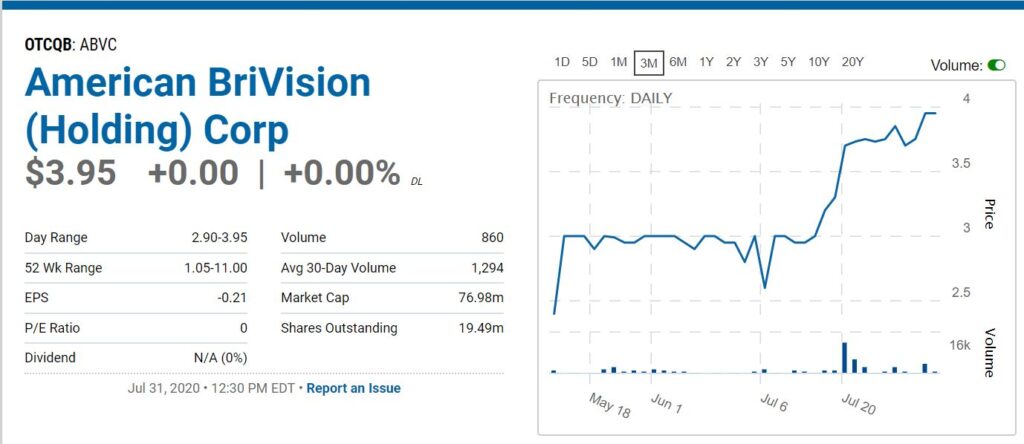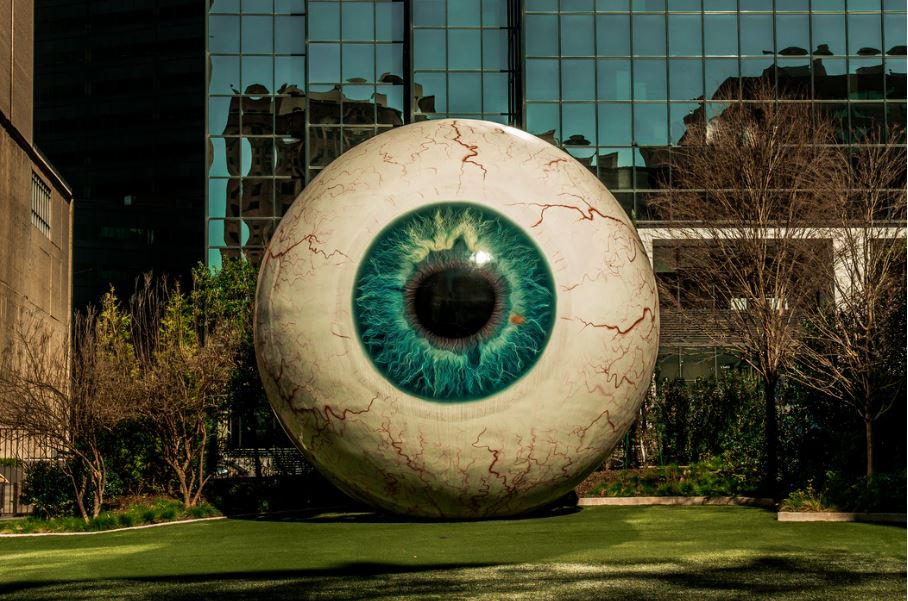American BriVision (ABVC) Reports Completion of ABV-1505 Phase II Part I Clinical Trial for Treatment of Adult ADHD.
Last patient last visit (LPLV) marked the final step toward the completion of ABV-1505 Phase II Part I clinical trial in treatment of adult attention-deficit hyperactivity disorder (ADHD).

· Preliminary Phase II Part I results indicated effective dosage and treatment period of ABV-1505.
· Phase II Part II study is expected to follow after the completion of the clinical study report (CSR) of the Phase II Part I study.
FREMONT, CA, July 28, 2020 (GLOBE NEWSWIRE) — via NEWMEDIAWIRE — American BriVision (Holding) Corporation (OTCQB: ABVC), a clinical stage biopharmaceutical company focused on supporting novel therapeutic solutions in oncology/hematology, CNS, and ophthalmology, today announced that on July 15, 2020, the last patient last visit (LPLV) marked the final step toward the completion of the ABV-1505 Phase II Part I clinical trial for the treatment of adult ADHD.
This current trial is an open label, single-center and dose escalation study designed for the enrollment of six adult ADHD patients. During the trial, each patient received a low-dose treatment (380 mg) thrice daily for 28 days, followed by a high-dose treatment (760 mg) thrice daily for another 28 days. The primary objective of this study is to determine the effective doses and treatment period of ABV-1505 in adult patients with ADHD. The secondary objective is to evaluate the safety of ABV-1505 in patients receiving the drug at various dose levels.
A final monitoring visit with the clinical team at the University of California San Francisco (UCSF) Medical Center was conducted and completed on July 22, 2020. It is expected that the company will issue a clinical study report (CSR) in Q4 2020. Following issuance of the report, a Phase II Part II study will be conducted at the UCSF Medical Center and at major medical centers in Taiwan.
“We are pleased to report the LPLV of our ABV-1505 Phase II Part I clinical trial for the treatment of adult ADHD,” said Dr. Howard Doong, Chief Executive Officer of American BriVision. “And we are extremely grateful to the investigators at UCSF and to the patients who made the study possible, particularly during this challenging COVID-19 pandemic period. Based on encouraging Phase II trial results thus far with our ABV-1504 to treat major depressive disorder (MDD), we expect ABV-1505 to be equally or even more effective than many of the medications currently available to relieve ADHD sufferers. Additionally, we expect patients to experience mild to moderate, if any, side effects from the ABV-1505.”
Dr. Doong noted that both ABV-1504 and ABV-1505 are derived primarily from the plant-based compound PDC-1421. “We look forward to initiating the Phase II Part II study for adult ADHD later this year or in early 2021.”
According to Grand View Research, the global ADHD market size was valued at $16.4 billion in 2018 and is estimated to exhibit a CAGR of 6.4% through 2025, driven by worldwide drug product approvals and launches supported by increased research and development activities.
About American BriVision
American BriVision is a clinical stage biopharmaceutical company focused on utilizing its licensed technology to conduct proof-of-concept trials through Phase II of the clinical development process at world-famous research institutions (such as Stanford University, University of California at San Francisco, and Cedars-Sinai Medical Center). The company has an active pipeline of six drugs and one medical device (ABV-1701/Vitargus®) under development.
Disclaimer
Clinical trials are in early stages and there is no guarantee that any specific outcome will be achieved. Past performance is not indicative of future results. Investments may be speculative and illiquid, and there is a risk of loss.
CAUTIONARY STATEMENT CONCERNING FORWARD LOOKING STATEMENTS
This document contains forward-looking statements. In addition, from time to time, we or our representatives may make forward-looking statements orally or in writing. We base these forward-looking statements on our expectations and projections about future events, which we derive from the information currently available to us. Such forward-looking statements relate to future events or our future performance, including: our financial performance and projections; our growth in revenue and earnings; and our business prospects and opportunities. You can identify forward-looking statements by those that are not historical in nature, particularly those that use terminology such as “may,” “should,” “expects,” “anticipates,” “contemplates,” “estimates,” “believes,” “plans,” “projected,” “predicts,” “potential,” or “hopes” or the negative of these or similar terms. In evaluating these forward-looking statements, you should consider various factors, including: our ability to change the direction of the Company; our ability to keep pace with new technology and changing market needs; our having adequate funding to conduct our clinical trials; the competitive environment of our business; the current COVID-19 pandemic and its impact on our operations. These and other factors may cause our actual results to differ materially from any forward-looking statement. Forward-looking statements are only predictions. The forward-looking events discussed in this document and other statements made from time to time by us or our representatives, may not occur, and actual events and results may differ materially and are subject to risks, uncertainties and assumptions about us. We are not obligated to publicly update or revise any forward-looking statement, whether as a result of uncertainties and assumptions, the forward-looking events discussed in this document, and other statements made from time to time by us or our representatives that might occur.
Contact:
Andy An – Chief Financial Officer
765-610-8826
andyan@ambrivis.com












